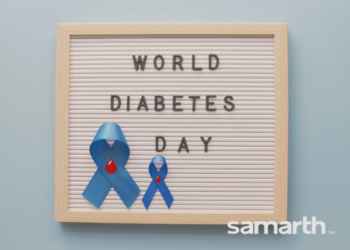From cornflakes to cookies and even ketchup, practically every packaged food today has some amount of added sugar. Now, you may believe that a little sugar hurt nobody. Well, naturally occurring sugar in moderation is not bad for you; added sugar, on the other hand, can lead to various health problems, including hypertension, heart diseases, obesity, and diabetes.
Whether it’s children, adults, or seniors, diabetes and obesity are two of the leading lifestyle diseases today. A diet that is rich in added sugar and processed foods can result in elevated blood glucose levels along with high blood pressure. High sugar diets can also lead to inflammation and raise triglyceride levels.
The American Heart Association recommends an added-sugar limit of no more than 100 calories per day, which is about six teaspoons or 24 grams of sugar, for most women and no more than 150 calories per day, which is about nine teaspoons or 36 grams of sugar, for most men.

Join Now >
According to the World Health Organization, reducing a person’s sugar intake to below 5% comes with its share of health benefits. Moreover, as we age, our digestive system weakens and is unable to process sugar like it used to. This is why as a senior, keeping a check on our sugar consumption is one of the most important steps towards leading a healthier and happier lifestyle. And if you’re a senior who has diabetes, it is now more important than ever to maintain a healthy blood sugar level
Following a balanced diet is one way to keep a check on your blood glucose levels. If you’re a fan of carbonated drinks and sugary desserts, we suggest you cut down or choose healthier alternatives. Be wary of certain seemingly healthier food options that are often marketed as diet-friendly but are not.
Whether you’re looking to cut down/substitute your sugar because of the health risks, or you simply want to shed a few kilos, your best bet is gradually weaning yourself off sugar and opting for healthier alternatives. As a way of managing their sugar intake, some people turn to artificial sweeteners like aspartame, sucralose, and saccharin. While they have gained popularity over the years, artificial sweeteners have been under the scanner for their harmful side effects, especially for seniors. Fortunately, there are healthier alternatives that you can enjoy as a senior, sans the guilt trip and empty calories.
Here’s a quick guide to help you choose the best natural sugar substitute to sweeten your day.
Date Syrup
With a better nutritional profile than sugar, date syrup is extracted from the fruit and is packed with various nutrients, minerals and antioxidants. Owing to its high fibre content, date syrup has a lower glycaemic index, which means it is less likely to spike your blood sugar.
Its distinct taste and flavour profile makes it a popular sugar substitute in desserts and baked goods. However, we suggest you stay away from commercially produced date syrups as the nutritional benefits of dates don’t usually make it to the final bottled product.
Stevia
Extracted from a South African shrub known scientifically by the name of Stevia rebaudiana, stevia is a natural sweetener that boasts zero calories. Since it has no effect on your blood sugar levels, it can be safely used by people with diabetes.
Moreover, stevia is 100 to 300 times sweeter than sugar, so you eventually end up using much less. Some studies also indicate that stevia can help keep your blood pressure in check. If you experience a slightly bitter or metallic aftertaste, don’t worry, it’s completely normal.
Xylitol
Found naturally in certain fruits and vegetables, xylitol is a sugar alcohol that is extracted from corn or birch wood. Like stevia, xylitol too has close to no effect on blood sugar levels, which makes it a safe option for seniors with diabetes.
Xylitol is 100% as sweet as sugar, and it contains 2.4 calories per gram, which is 40% fewer calories than sugar. Studies indicate that xylitol can help reduce the risk of cavities and tooth decay and is also known to increase the body’s absorption of calcium. However, please keep in mind that xylitol is not calorie-free, so it should be consumed in moderation.
Coconut Sugar
Made from the sap of coconut palm, coconut sugar is quite the rage these days. It is packed with minerals and vitamins, including potassium, iron, and calcium. It also contains inulin fibre, which helps keep the blood sugar levels balanced by slowing the absorption of glucose.
However, please note that while it is natural and boasts of some nutrients, coconut sugar contains almost the same number of calories per serving as regular sugar. It is also very high in fructose, which is why it should be used in moderation.
Honey
Considered to be one of the oldest sweeteners in the world, honey is extracted from honeycombs. Some studies show that consuming honey helps boost the levels of antioxidants in your blood. Due to its anti-inflammatory, antibacterial, and antiseptic properties, it has also been used as a healing agent for years now.
However, honey has a similar impact on blood glucose levels as sugar, which is why there is no advantage of substituting sugar with honey for diabetics. You also cannot cook with honey as on being heated, it undergoes an adverse chemical change that negates its nutritional effects.
Before you make any significant changes to your diet, we suggest you consult your health care provider. Also, keep in mind that usually, no food groups pose any health risks when consumed in moderation. So, instead of focusing on one ingredient, we recommend a more holistic approach that leads with a healthy diet plan and regular exercise.












235969 841923Dead written topic matter, Genuinely enjoyed reading through . 513224
584463 53032of course data entry services are extremely expensive that is why always make a backup of your files 337225
257364 628716What is your most noted accomplishment. They may possibly want very good listeners rather than great talkers. 285699